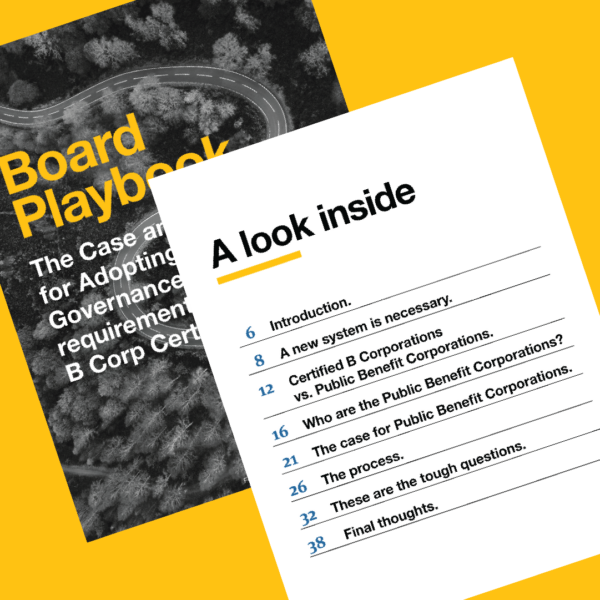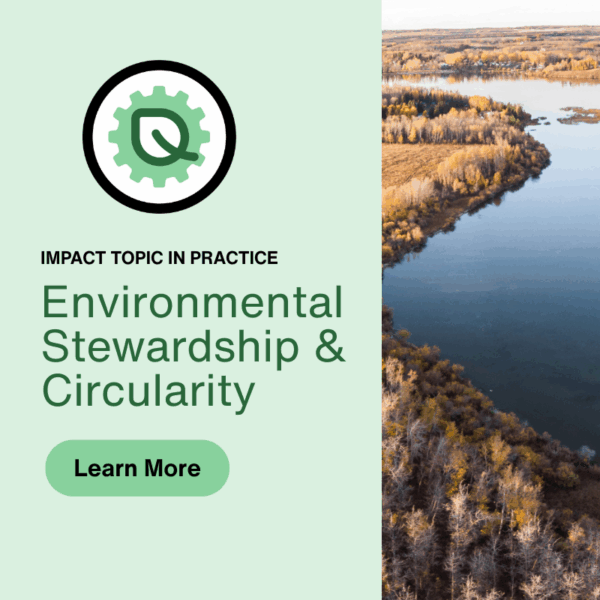How Patagonia and Allbirds Set the Pace on Their Journey as Sustainable Leaders
February 8, 2021
B Corps Tackle the Impending Climate Crisis While Sharing Innovative Practices and Materials
This article is the third in a series of Founding B Corp interviews, where B The Change holds conversations between Certified B Corporations that helped establish the B Corp movement and newer businesses in the B Corp community. The series ties the reasons for the B Corp inception through to today’s discussions around business’s role in solving global and social issues.
Patagonia and Allbirds, two companies inspired by the natural world, are known as industry leaders when it comes to environmental advocacy and sustainable practices. But their leaders say they — and other businesses — should and must do more to address the impending climate crisis and environmental consequences.
As Certified B Corporations and benefit corporations, Patagonia and Allbirds are among businesses that consider the Earth as a stakeholder and factor their impact on the planet into their policies and practices as well as their mission and values. But they can’t achieve these environmental goals alone: These leaders must work with others in their industries to confront the climate crisis while also advocating for policy and practices that encourage all businesses to take true climate action.
Patagonia CEO Ryan Gellert says the outdoor apparel company’s work to improve its products and practices while considering impact on a range of stakeholders is an ever-changing challenge — and they hope others follow their lead.
“We’re 48 years into this and we’re not a sustainable company. If anything, we’re a responsible one in that we really try to be clear-eyed about our impacts, and we’re really deeply committed to not only trying to work through the biggest issues in our supply chains and elsewhere, but also scaling solutions and open sourcing them to industry and beyond,” he says.
Gellert discussed Patagonia’s innovative practices during a recent conversation for B The Change with Joey Zwillinger, co-CEO of Allbirds, a sustainable footwear and apparel company known for its innovative materials and carbon-neutral commitment that has grown from five employees in 2016 to more than 400 now. What follows are excerpts from their conversation.
As both B Corps and benefit corporations, your companies are grounded in a focus on stakeholders. How does that structure come into play when addressing the current societal challenges — climate, racial justice, and others?
Ryan Gellert: The person that started the company is the same gentleman that still owns the company, so our values have been pretty deeply institutionalized. Becoming a benefit corporation and becoming part of the B Corp community: This made us better in so many ways. Using the B Impact Assessment and being part of this community have really dimensionalized us on social issues and in thinking more broadly about our responsibilities.
In some of these areas, we feel like we’ve been working at it for a long time and thinking about it deeply. In other areas, less so. As it relates to racial justice, this last year has been incredibly humbling. It has been for me, and I think it has been for us as a company and as a culture. Really looking deeply both internally, and then earning the right, is kind of how I think we need to think about it, to have a voice and to use it and participate in the conversation externally.
Joey Zwillinger: That resonates with me quite a lot, and I love that humility that you expressed there, Ryan. Similarly, when we started the business and we did our first B Impact Assessment, I was a little bit jaded in the sense that it was like a one-size-fits-all standard that has to apply to the local grocery store down the street and a multinational consumer products company. But it really does force you to be better on a whole number of dimensions as a result of actually trying to capture every kind of business, which has been a positive impact.
Where that’s led us is to a strategy where we think that all aspects of stakeholder governance, where we’re looking and trying to take care of a whole host of different stakeholders, not just the environment, which is our really core focus and our stated public benefit, but all of these different aspects. One of the driving factors that I think about is really trying to understand the externalities that we create as a company and try to make sure that we pay for them or cover them, or make sure that we are investing back in the different ways that we are taking. That’s something that we’re quite mindful of as a company, and we’ve tried to institute a number of different processes to hold ourselves accountable to that.
Gellert: That’s really encouraging to hear. We are so often held up as this example of sustainability, particularly in the business sector. And the reality is, we’re 48 years into this and we’re not a sustainable company. If anything, we’re a responsible one in that we really try to be clear-eyed about our impacts, and we’re really deeply committed to not only trying to work through the biggest issues in our supply chains and elsewhere, but also scaling solutions and open sourcing them to industry and beyond. But there is a tremendous amount of work to be done still, and I think often what we’re reminded of is the reward for solving one problem or challenge is an invitation to a bigger one. That’s been our journey.

A New Way of Doing Business
To help business leaders navigate the journey to adopt benefit corporation status as a requirement of B Corp Certification, B Lab U.S. & Canada is releasing a new downloadable resource, the Board Playbook, to lay out the process and demystify the risks.
How do your companies plan to move forward with their roles in policy advocacy on issues surrounding climate, stakeholder governance, and benefit corporations?
Zwillinger: Legislation is one aspect that we have tried to work on. I find that a lot of particularly large companies, public companies, say the right thing and then they work through their trade associations and do the opposite. For example, the Footwear Distributor Retailers of America, FDRA, is the major trade association in our industry. We recently got them to adopt a statement that says that every one of the members in the trade association is going to advocate for a price on carbon and have it levied upstream of us, and have it applied equally based on carbon intensity of the materials and the products that all the members make. It’s a great move from the association.
We can utilize associations to make sure that we’re not just lobbying as a single company. When you get Target and Walmart and Nike and Adidas and every single one of the people that are members to actually make a statement on carbon policy, it’s quite powerful.
Allbirds has self-imposed a carbon tax, so we measure the climate change impact that we make as a company down our entire supply chain. We measure it, we try to get it to zero, but in the meantime we pay for carbon offsets along the way. That creates a line item of cost on our profit and loss statement that we need to compensate for, and that is an incentive along with other mechanisms that we put in place in the company to drive us down to zero.
Gellert: It’s inspiring, and certainly we’re going through some similar things and have some other things that have been in place for some time. We’ve developed a tool called an environmental profit-loss statement that we can apply to each specific product to really understand its impact.
We’re running out of time to address the climate crisis, so we have to really be holistic and focus on root-cause issues. And holistic for us is using our core business and our supply chain. It’s using our voice. It’s using our resources. It’s working with our community. And I think that a lot of companies say one thing and then indirectly or directly participate in a lot of other things through trade associations, and I think that’s a critical call out Joey made.

Impact Topic in Practice
This guide focuses on the Environmental Stewardship & Circularity Impact Topic, which asks companies to take a conscientious and sustainable approach and to become environmental stewards, demonstrating accountability and leadership. Download the guide for examples and resources to support your business in meeting the requirements within this Impact Topic.
You both have mentioned running out of time to address pressing climate concerns. So how do you focus your companies on the long game as well as doing things right and not making just surface changes that leave these underlying problems of inequity and extraction unsolved?
Zwillinger: First of all, I want to share some form of optimism. There are massive business opportunities and economic opportunities that are going to come out of the fight to combat climate change, which for some reason people think is counterintuitive. More on a microlevel, we are far from perfect and the goal posts keep moving. We keep learning more, and new science evolves. So we’ve tried to create frameworks that we think will stand the test of time and drive us not only to zero net-carbon impact but to beyond that, and do things that are net-positive for the planet.
Like Patagonia, we’re focused on regenerative agriculture in terms of a really core focus on developing natural fibers and polymers — that can be derived through green chemistry from bio-based materials — that can make a net positive impact on the climate. We hope that we can actually, at some point, be a dividend to the planet when people buy our products. That’s really the driving goal. So then how do we ladder from that, which sounds a little philosophical, down to tactical?
First, we measure everything. We then hold ourselves accountable and we label the carbon intensity of our products on every single product at every customer touch point. We try to synthesize this into a simple, singular metric that is your scorecard for whether you’re combating or contributing to climate change. And we hope that a lot of people adopt this tool.
Secondly, we report on all of this to our board of directors, and we have significant governance in place around this topic. Thirdly, we then pay for this pollution. So we have carbon offsets, and we also have a rule internally that if we’re considering a cost of materials increase to add a component that might be lower carbon intensity, the trade-off is the social cost of carbon as estimated in the best literature, which is around $50 per metric ton. And then lastly and notably, we compensate people for this. Our directors and above at our company have variable compensation, and 20% of their compensation is based on whether they reach carbon emission reduction targets each year.
Gellert: Yes, I hear a lot of similarities there, on agriculture, on metrics, and on ambitions around circularity and otherwise. We’re a big believer in making the decisions that we believe are right, and then dealing with the outcomes of that, whatever they may be. And that increasingly, and in some ways unfortunately, has meant using our voice to take positions on calling people out where we thought that was necessary and becoming more engaged directly. Moving from supporting activists and the work that they’ve done, which is something we’ve been involved in for a long time, but to getting more directly engaged in activism ourselves.
But our ambition is to be in business 100 years from now on a living planet with healthy customers. That’s the goal and that’s also how we frame our decision-making. One of the other things that we’re really focused on internally is creating different ways for customers to interact with Patagonia. That’s product repair. It’s also allowing customers to sell back product that is still usable but they’re done using, so that we can offer it for resale at more approachable price points. Rental I think is an opportunity in the future, as is taking responsibility for every product we’ve ever made. Ultimately the big idea there is a relationship between us and our customers where we’re collectively trying to accomplish the same things, and we’re enabling that on our side.
Zwillinger: I’m proud of our SweetFoam, which we co-innovated with a company down in Brazil to create a carbon-negative material from a waste stream of sugarcane processing. Then we were able to open source that, which had both altruistic and pragmatic benefits around dropping the price for everyone and us included of that material, and also obviously doing a massive impact for combating climate change when a lot of people have adopted it. Over 100 brands have sampled, and dozens are starting to roll it out in their supply chain, which is pretty cool.
Gellert: Yes, and that’s really important work. And I think you made the point perfectly: It’s one thing to do things because you know they’re right, another thing to also acknowledge that they can be good for the business as well. We developed, after six, seven years of a lot of time and energy and money, the first non-neoprene wetsuit made out of a natural rubber material, Yulex, and we open sourced the supply chain for that as quickly as we brought it to market. And it’s the same motivation. Number one, it’s a better way of building wetsuits. And number two, the more people adopt it, the more ubiquitous it will be and the cheaper the price it will be. So there can be nothing wrong with an element of self-interest there as well as we try to tackle some of these big problems.
Our goal here is not just to do the right thing in some of this as well. It’s to build profitable businesses within the business, because we believe that’s the only way it’s going to scale. When you share these stories with people, they say, “Great story. Thanks for the 20 minutes of free entertainment, but it doesn’t apply to us.” Part of our responsibility is to prove that these things can really be profitable pieces of business in changing the way that we all engage with what often is treated as throwaway product.
Sign Up for our B The Change Newsletter
Read stories on the B Corp Movement and people using business as a force for good. The B The Change Newsletter is sent weekly.
